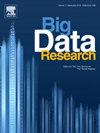BETM: A new pre-trained BERT-guided embedding-based topic model
IF 4.2
3区 计算机科学
Q2 COMPUTER SCIENCE, ARTIFICIAL INTELLIGENCE
引用次数: 0
Abstract
The application of topic models and pre-trained BERT is becoming increasingly widespread in Natural Language Processing (NLP), but there is no standard method for incorporating them. In this paper, we propose a new pre-trained BERT-guided Embedding-based Topic Model (BETM). Through constraints on the topic-word distribution and document-topic distributions, BETM can ingeniously learn semantic information, syntactic information and topic information from BERT embeddings. In addition, we design two solutions to improve the problem of insufficient contextual information caused by short input and the issue of semantic truncation caused by long put in BETM. We find that word embeddings of BETM are more suitable for topic modeling than pre-trained GloVe word embeddings, and BETM can flexibly select different variants of the pre-trained BERT for specific datasets to obtain better topic quality. And we find that BETM is good at handling large and heavy-tailed vocabularies even if it contains stop words. BETM obtained the State-Of-The-Art (SOTA) on several benchmark datasets - Yelp Review Polarity (106,586 samplest), Wiki Text 103 (71,533 samples), Open-Web-Text (35,713 samples), 20Newsgroups (10,899 samples), and AG-news (127,588 samples).
BETM:一种新的预训练bert引导的基于嵌入的主题模型
主题模型和预训练BERT在自然语言处理(NLP)中的应用越来越广泛,但目前还没有一个标准的方法来整合它们。本文提出了一种新的预训练bert引导的基于嵌入的主题模型(BETM)。通过对主题-词分布和文档-主题分布的约束,BETM可以巧妙地从BERT嵌入中学习语义信息、句法信息和主题信息。此外,针对BETM中短输入导致的上下文信息不足和长输入导致的语义截断问题,我们设计了两种解决方案。我们发现BETM的词嵌入比预训练好的GloVe词嵌入更适合于主题建模,并且BETM可以针对特定数据集灵活地选择预训练BERT的不同变体,从而获得更好的主题质量。我们发现,即使包含停止词,BETM也能很好地处理大而重尾的词汇。BETM在几个基准数据集上获得了最先进的(SOTA) - Yelp Review Polarity(106,586个样本),Wiki Text 103(71,533个样本),Open-Web-Text(35,713个样本),20Newsgroups(10,899个样本)和AG-news(127,588个样本)。
本文章由计算机程序翻译,如有差异,请以英文原文为准。
求助全文
约1分钟内获得全文
求助全文
来源期刊

Big Data Research
Computer Science-Computer Science Applications
CiteScore
8.40
自引率
3.00%
发文量
0
期刊介绍:
The journal aims to promote and communicate advances in big data research by providing a fast and high quality forum for researchers, practitioners and policy makers from the very many different communities working on, and with, this topic.
The journal will accept papers on foundational aspects in dealing with big data, as well as papers on specific Platforms and Technologies used to deal with big data. To promote Data Science and interdisciplinary collaboration between fields, and to showcase the benefits of data driven research, papers demonstrating applications of big data in domains as diverse as Geoscience, Social Web, Finance, e-Commerce, Health Care, Environment and Climate, Physics and Astronomy, Chemistry, life sciences and drug discovery, digital libraries and scientific publications, security and government will also be considered. Occasionally the journal may publish whitepapers on policies, standards and best practices.
 求助内容:
求助内容: 应助结果提醒方式:
应助结果提醒方式:


